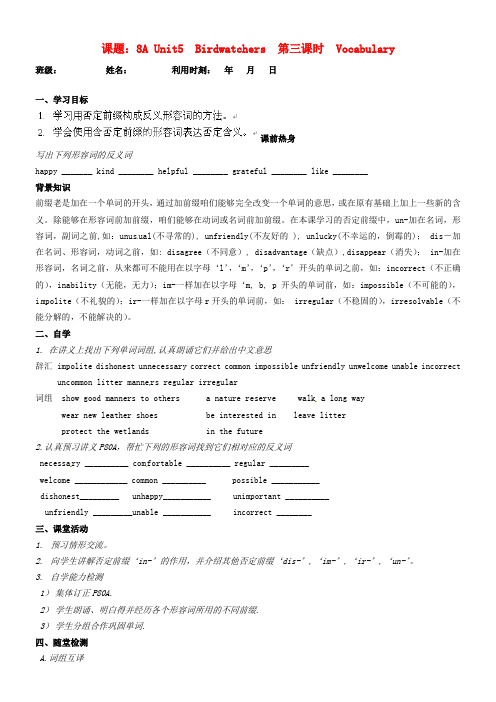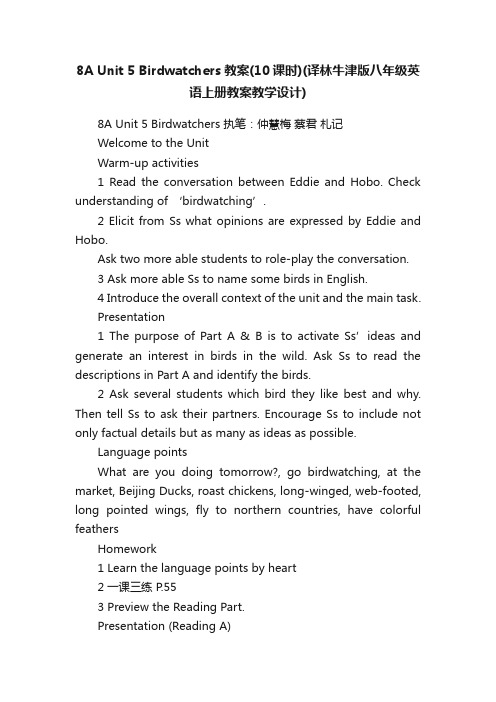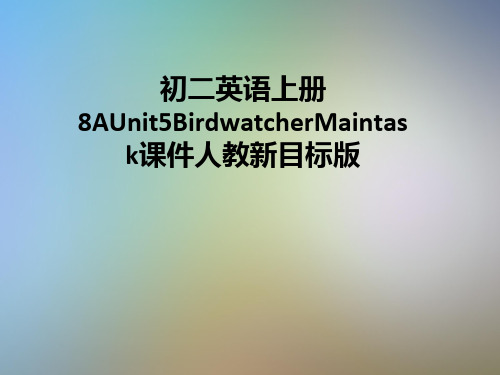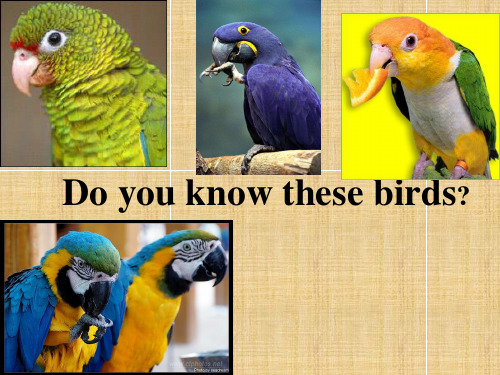八年级英语上册8AUnit5Birdwatchers第三课时Vocabulary学案无答案牛津版
- 格式:doc
- 大小:94.00 KB
- 文档页数:3

课题:8A Unit5 Birdwatchers 第三课时 Vocabulary班级:姓名:利用时刻:年月日一、学习目标课前热身写出下列形容词的反义词happy _______ kind ________ helpful ________ grateful ________ like ________背景知识前缀老是加在一个单词的开头,通过加前缀咱们能够完全改变一个单词的意思,或在原有基础上加上一些新的含义。
除能够在形容词前加前缀,咱们能够在动词或名词前加前缀。
在本课学习的否定前缀中,un-加在名词,形容词,副词之前,如:unus ual(不寻常的), unfriendly(不友好的 ), unlucky(不幸运的,倒霉的); dis-加在名词、形容词,动词之前,如: disagree(不同意), disadvantage(缺点),disappear(消失); in-加在形容词,名词之前,从来都可不能用在以字母‘l’,‘m’,‘p’,‘r’开头的单词之前,如:incorrect(不正确的),inability(无能,无力);im-一样加在以字母‘m, b, p开头的单词前,如:impossible(不可能的),i mpolite(不礼貌的);ir-一样加在以字母r开头的单词前,如: irregular(不稳固的),irresolvable(不能分解的,不能解决的)。
二、自学1. 在讲义上找出下列单词词组,认真朗诵它们并给出中文意思辞汇 impolite dishonest unnecessary correct common impossible unfriendly unwelcome unable incorrect uncommon litter manne rs regular irregular词组 show good manners to others a nature reserve walk a long waywear new leather shoes be interested in leave litterprotect the wetlands in the future2.认真预习讲义P80A,帮忙下列的形容词找到它们相对应的反义词necessa ry __________ com fortable __________ regular _________welcome ____________ common __________ possible ___________dishonest_________ unhappy___________ unimportant __________unfriendly _________unable ___________ incorrect ________三、课堂活动1.预习情形交流。

8A Unit 5 Birdwatchers教案(10课时)(译林牛津版八年级英语上册教案教学设计)8A Unit 5 Birdwatchers 执笔:仲慧梅蔡君札记Welcome to the UnitWarm-up activities1 Read the conversation between Eddie and Hobo. Check understanding of ‘birdwatching’.2 Elicit from Ss what opinions are expressed by Eddie and Hobo.Ask two more able students to role-play the conversation.3 Ask more able Ss to name some birds in English.4 Introduce the overall context of the unit and the main task.Presentation1 The purpose of Part A & B is to activate Ss’ideas and generate an interest in birds in the wild. Ask Ss to read the descriptions in Part A and identify the birds.2 Ask several students which bird they like best and why. Then tell Ss to ask their partners. Encourage Ss to include not only factual details but as many as ideas as possible.Language pointsWhat are you doing tomorrow?, go birdwatching, at the market, Beijing Ducks, roast chickens, long-winged, web-footed, long pointed wings, fly to northern countries, have colorful feathersHomework1 Learn the language points by heart2 一课三练 P.553 Preview the Reading Part.Presentation (Reading A)1 Before Ss look at this page, review vocabulary of wildlife and conversation previously taught.2 Write the title ‘Zhalong-A special place’ on the board. Ask Ss what they know about it. Ask where do you think it is? What kind of animals live there? Etc. . Encourage any contributions.3 Encourage Ss to visit some of the websites providing information about Zhalong before the lesson.4 Ask pairs of Ss to exchange information and opinions about the different materials they are studying.5 Ask more able Ss to look for names and descriptions of birds. Have a class feedback using Ss’ rese arch skills.6 Read the title and explain the context. Ask questions about why Ss think that Zhalong is a special place.7 Ask Ss to skim the text quickly,focusing on key words and main points only. Set a strict time limit and tell them in advance that they only have 8 minutes, for example, to read the text. Then ask volunteers to each read a paragraph to the class.9 Ask Ss to write a caption for each paragraph.Presentation (Reading B)1 Ask students to do Part B1 as a quiz.2 Divide the class into groups of six. Choose a group to start the competition. Ask what does ‘endangered’ mean? Set a time limit for each group to answer.3 In pairs, Ss read and complete the conversation. Invite some of them to read it in front of the class.Presentation (Reading C)1 Divide the class into teams of 4-5 students. Do Part C1 asa quiz. Set a time limit.2 Ask students to correct the false sentences.3 Encourage discussions about why a sentence is wrong in order to develop Ss’ deductive skills.Language points (Part A)A nature reserve, in north-east China, one of the world’s most important wetlands, wildlife, provide sth. for sb. ,different kinds of, all year round, for a short stay, there are many fish, catch them for food, the rare red-crowned cranes, change the wetlands to make more space for farms, less and less space for wildlife, have enough space, the Chinese government, protect these endangered birds, a lot tourists, members of our Birdwatching Club, study the different kinds of birds, the changes in their numbers, a bird count, the importance of wetlandsLanguage points (Part B)Areas of land with wet ground, areas of land for farming, a place to live or stay, in a dangerous state, a large number of, people who are traveling, be important forLanguage points (Part C)Find food easily, in other parts of the world, have enough space to live, the ideal home for many plants, fish and birds Homework1 Learn the language points by heart.2 一课三练 P.56-573 Preview the Vocabulary Part.Presentation (Vocabulary)1 Elicit some adj. with negative meaning, e.g., ‘unhappy’, ‘uncomfortable’. Write the word on the Bb and underline the prefixes. Explain that these prefixes change the meaning of an adj. from positive to negative.2 Before starting on Part A, revise the meaning of all the positive adj. Ask more able Ss to use the words to makesentences to check comprehension.3 Explain the context of Part B.4 In pairs, Ss select suitable adj. from Part A. Then ask each pair to compare answers with another pair. Check answers with the class as awhole.Language pointsA protected area, leave litterHomework1 Learn the language points by heart.2 一课三练 P.583 Preview the Grammar Part.Presentation (Grammar Part A)1 Talk to Ss about organizing a school trip.2 Ask Ss to think of a school trip they would like to join in the future. Try to find some ads to help them to choose an event.Write some questions on the Bb:* When does the walk/competition start/finish?* What time does the coach leave?* Where/When do we meet?3 Point out the u se of the time expression ‘tomorrow’.4 Elicit the use of the simple present tense to talk about future events.5 Explain the context of Mr Wu planning a school trip to Beijing Wildlife Park. Point to the timetable and ask questions.Presentation (Grammar Part B)1 Ask Ss What are you doing tonight? to elicit sentences with the present continuous tense.2 Elicit from Ss the use of the present continuous tense. Point out that when using the present continuous tense to talk about the future, we normally talk about future events which arescheduled for the immediate future.3 Carefully explain the context of Part B.4 Ask students to read the conversation on their own, trying to make sense of it without focusing on the tense. Then ask them to fill in the blanks.4 Ss read the conversation in pairs, checking the correct use of the verb forms.Presentation (Grammar Part C)1 Elicit from Ss some sentences with adverbs.2Write the adv. From the table on the Bb, ask more able Ss to underline the suffix ‘-ly’ in the examples and formulate the rule.3 Ask Ss to add more examples to each group of adj. in the table.4 Check answers with the whole class.5 Ask Ss to Complete ‘Work out the rule’.6 Ask Ss to read the article in Part C2 silently on their own first. Ask Ss to complete the article using the correct adv. From Part C1.7 Ask Ss to work in pairs and rearrange the words to complete sentences in Part C3.Language pointsReturn to school, at the entrance, sandwiches, greet us politelyHomework1 Learn the language points by heart.2 一课三练 P.59-603 Preview the Integrated skills Part.Presentation (Integrated skills A)1 Try to maintain Ss’ interest in birdwatching and Zhalong.2 Remind Ss of the article about Zhalong which they read in the reading section. Ask Ss if they remember any facts about Zhalong.3 Ask Ss to read the quiz and try to answer the questions from the memory and general knowledge.4 Explain that Ss will listen to a radio program about Zhalong. Play the recording. Students listen carefully and tick the second column of boxes as they hear it.4 Check the correct answers with the whole class.5 Ask students to read the report in Part A3 in pairs. Go through the words in the bracket.Presentation (Integrated skills B)1 Close the books and listen to me while I read the conversation. Ask students to repeat the sentences as they hear them.2 Ask students to practice the conversation in pairs and then change roles.3 Ask students to work in pairs and create another conversation by replacing the underlined words.Language pointsincludingHomework1 Learn the language points by heart.2 一课三练 P.613 Preview the Study Skills, Main task & CPresentation (Study skills)1 Brainstorm from Ss when people need to take notes. Read 2-3 sentences and ask Ss to take notes as a warm-up activity.2 Ask Ss what kind of notes are considered good.3 Explain the context of Part A. Ask students to do the taskon their own and then compare their answers with a partner.4 Elicit from Ss other short forms widely used in dictionaries or other written texts.5 Tell students to read them again.Language points (Study skills)For example, per centPresentation (Main task)1 Introduce the topic of joining an organization. If possible, find out about similar writing.2 Introduce the idea that people need to apply formally before they are accepted to join a club..3 Explain the context of Part A. Go through the application form and explain any unfamiliar or difficult vocabulary.4 Ask Ss to discuss their own details with a partner.Language points (Main task)Application form, date of birth,Presentation (Checkout)1 Ss do Part A on their own and compare their answers witha partner. Ask them to practice reading the conversation in pairs.Language points (Checkout)simplyHomework1 Learn the language points by heart.2 一课三练 P.62-643 Preview the Unit 6。

江苏省淮北中学英语学科教案
初二年级教案活页纸主备人:陈小军审核人:初二英语组全体老师
江苏省淮北中学英语学科教案
初二年级教案活页纸主备人:陈小军审核人:初二英语组全体老师
江苏省淮北中学英语学科教案
初二年级教案活页纸主备人:陈小军审核人:初二英语组全体老师
江苏省淮北中学英语学科教案
初二年级教案活页纸主备人:陈小军审核人:初二英语组全体老师
江苏省淮北中学英语学科教案
初二年级教案活页纸主备人:陈小军审核人:初二英语组全体老师
江苏省淮北中学英语学科教案
初二年级教案活页纸主备人:陈小军审核人:初二英语组全体老师
江苏省淮北中学英语学科教案
初二年级教案活页纸主备人:陈小军审核人:初二英语组全体老师
江苏省淮北中学英语学科教案
初二年级教案活页纸主备人: 陈小军审核人:初二英语组全体老师
初二年级教案活页纸主备人:陈小军审核人:初二英语组全体老师。


江苏省连云港市新浦中学八年级英语上册《8A Unit 5 Birdwatchers Period 3 Vocabulary》教学案(无答案)牛津版Learning Co ntent: Vocabulary四会内容:词汇:impolite dishonest unnecessary correct common imposs ible unfriendly unwelcome unable incorrect uncommon litter 词组:walk a long way wear new leather shoesleave litter there in the future其他内容:manners regular irregular show good man ners to othersLearning objectives:1Learn how to use prefixes to form adjectives with opposite mea ning ;2Learn how to use the right adjective words with prefixes to talk about the opposite meaningLearning proce duresActivity 1: leading inPart 1: Fr ee talk:Part 2: ask and answer questions of Reading in groupsActivity 2. Presentation.Part 1: show so me sentences and fill in the blanks wi thprefixes.1.Zhalong is a protected area. It isn’t allowed to hunt orfish there. It is______________ to kill wild animals.(correct)2.These trainers are comfortable to wear. But those are____________ (not comfortable).3.If someone shows good manners to oth ers, he is a politeperson. If someone does n’t show good manners to others, hei s ____________ (not polite )Part 2 : finish Exercise A on page 80Part 3 : wo rk out the rule: different prefixe s to formadjectives with opposite meaning. Modificationare the wetlands important for wildlife?birds live in Zhalong Nature Reserve ?are more and more birds in danger ?are the members of the Birdwatching Club studying?necessary--_________ important--_________happy--_________comfortable--_________ friendly--__________common--_________welcome--__________ able--_________ well--__________popul ar--__________ true--__________ tidy--__________ possible--__________ polite--__________correct--_________regular--_________ honest--_________Activity 3. PracticePart 1. work in pairs to say the opposite words with prefixes.Part 2. Play a game : see who can say the opposite w ords with prifixes correctly and quickly.try to find out the winners in each group Activity 4. ProductionPart 1: finish Exercise B on page 80Part 2: ch eck out the answers and read the sentences loudly Part 3: make sentences with prefixes according to the informa tion1.This is a “No Parking”area.2.This chair is too small.3.The boy didn’t tell the truth.4.The restaurant is quite near here.5.I don’t like him because he i s rude.6.I have never seen such heavy snow here.7.Water is v ery important to us.8.My grandfather knows nothing about computers.Activity 5 Exercises in class.complete the sentences with the negative form of the a djectives.able comfortable common ri endly happy necessary possibleYou will be ___________to see the birds if you do not bringa pair of binoculars. There are lots of __________ kinds ofbirds in Zhalong.It is __________ to see the birds and insects without waiting quietly.Some people are __________ to the birds. They scare them away and throw stones to them.It is __________ to study hard about different birds and insects before you go to Zhalong . The officers will explain everything to you.Some people feel __________ that the government gives birds such a big area of wetlands when poor people are living in small and __________ flats.Activity 6 Homeworkthe negative form of the adjectives with prefixes.to find out some other negatives form of adjectives with prefixes.3. Preview Grammar.。

2019-2020年八年级上册 Unit5《Birdwatchers》Vocabulary 学案牛津译林版一预习导学(两人合作自由讨论下列问题)1.Why are the wetlands important for wildlife?2.What birds live in Zhalong Nature Reserve ?3.Why are more and more birds in danger ?4.What are the members of the Birdwatching Club studying?二课堂导学Step 1. Presentation1Part 1: show some sentences and fill in the blanks with prefixes.2Zhalong is a protected area. It isn’t allowed to hunt or fish there.It is__________ to kill wild animals. (correct)1.These trainers are fortable to wear. But those are ____________(not fortable).2.If someone shows good manners to others, he is a polite person.If someone does n’t show good manners to others, he is ____________ (not polite )Part 2 : (小组合作)finish Exercise A on page 80Part 3 : (小组合作)work out the rule: different prefixes to form adjectives with opposite meaning.necessary___________ important_________happy________fortable_______ friendly__________ mon_________ wele___________ able_________ well__________ popular__________ true__________tidy__________possible__________ polite__________correct_________regular_________ honest_________Step2. PracticePart 1. work in pairs to say the opposite words with prefixes.Part 2. Play a game : see who can say the opposite words with prifixes correctly and quickly.try to find out the winners in each groupStep 3. Production(小组合作)Part 1: finish Exercise B on page 80Part 2: check out the answers and read the sentences loudlyPart 3: make sentences with prefixes according to the information 1.This is a “No Parking”area.________________________________2.This chair is too small.3.___________________________________4.The boy didn’t tell the truth.__________________________________5.The restaurant is quite near here.___________________________________6.I don’t like him because he is rude._____________________________7.I have never seen such heavy snow here.___________________________________8.Water is very important to us._____________________________________9.My grandfather knows nothing about puters._________________________________________Step 4 Exercises in class. (小组合作)plete the sentences with the negative form of the adjectives.1 You will be _______ to see the birds if you do not bring a pairof binoculars. There are lots of ____________ kinds of birds in Zhalong.2 It is ____________ to see the birds and insects without waiting quietly.3 Some people are _________ to the birds. They scare them away and throw stones to them.4 It is _________to study hard about different birds and insectsbefore you go to Zhalong . 5 The officers will explain everything to you.6 Some people feel ___________ that the government gives birds sucha big area of wetlands when poor people are living in small and_____________ flats.Step 5 ConsolidationI. Finish off the sentences using the correct adjs1. Zhalong is a nature reserve. It’s to hunt fish or hunt there2. When you go birdwatching, you sometimes have to walk a long way.If you wear new leather shoes, they can be .3. If you are interested in birds, you can go to Zhalong. But if youleave litter there, you will be4. There are not many red-crowned cranes in the world, they are .5. If we do not protect the wetlands, it will be to see these birds in theStep6 Homework1.remember the negative form of the adjectives with prefixes.2.try to find out some other negatives form of adjectives with prefixes.3. Preview Grammar.4 Give the English for the sentences.1. 一些人对鸟不友好________________________________________________________________2. 没有必要研究不同的鸟________________________________________________________________3. 许多穷人住在小而不舒服的房子里。
8A Unit5 Birdwatchers (Vocabulary & Grammar)导学案8A Unit5 Birdwatchers (Vocabulary & Grammar)导学案学法指导先复习书本P80-85上的内容,了解本课时相关单词、词组和句子。
完成书上巩固作业,弄清本课重点,最后完成效果自测。
学习目标及重难点. 1.能理解句子结构,识记相关词组和句子。
预习导学重点单词/词组/句子见默写纸预习效果自测用所给词的适当形式填空。
1. The show _________ (start) at 8 p.m..2. __________ ( lucky) , he did’t hurt himself.3. His plane _________ (leave) at 9 a.m tomorrow.4. Amy’s party ________ (begin) at 6 p.m. next Sunday.5. We ___________ (have) hamburgers for dinner this evening.6. She is a ___________ girl. She often does everything _______________.(careful)7.It’s too ___________. Some children are playing ____________ .(noise)8. The ___________ man shouted to us ______________.(angry)9. Mr Wu is a_________ man. So he can help you do it __________.(good)10. It’s _________ that he didn’t tell us the time ____________.(clear)11、Little Tom is sleeping, so we must walk _______ (quiet) and talk ________ (gentle).12、English is widely used all over the world. Do you know the ____________ (important) of learning English well now ? 13、Let’s go ________ ( birdwatch ) this Saturday, shall we?14、Our train ________ (leave) at nine o’clock tonight. 15、We _________ (have) noodles for dinner tonight.写出下列句子分别属于哪种基本句型,把字母填入括号内。
课题:8A Unit5 Birdwatchers 第三课时 Vocabulary
班级:姓名:使用时间:年月日
一、学习目标
课前热身
写出下列形容词的反义词
happy _______ kind ________ helpful ________ grateful ________ like ________
背景知识
前缀总是加在一个单词的开头,通过加前缀我们可以完全改变一个单词的意思,或者在原有基础上加上一些新的含义。
除了可以在形容词前加前缀,我们可以在动词或名词前加前缀。
在本课学习的否定前缀中,un-加在名词,形容词,副词之前,如:unus ual(不寻常的), unfriendly(不友好的 ), unlucky(不幸运的,倒霉的); dis-加在名词、形容词,动词之前,如: disagree(不同意), disadvantage(缺点),disappear(消失); in-加在形容词,名词之前,从来都不会用在以字母‘l’,‘m’,‘p’,‘r’开头的单词之前,如:incorrect(不正确的),inability(无能,无力);im-一般加在以字母‘m, b, p开头的单词前,如:impossible(不可能的),i mpolite(不礼貌的);ir-一般加在以字母r开头的单词前,如: irregular(不稳定的),irresolvable(不能分解的,不能解决的)。
二、自学
1. 在课本上找出下列单词词组,认真朗读它们并给出中文意思
词汇 impolite dishonest unnecessary correct common impossible unfriendly unwelcome unable incorrect uncommon litter manne rs regular irregular
词组 show good manners to others a nature reserve walk a long way
wear new leather shoes be interested in leave litter
protect the wetlands in the future
2.认真预习课本P80A,帮助下列的形容词找到它们相对应的反义词
necessa ry __________ com fortable __________ regular _________
welcome ____________ common __________ possible ___________
dishonest_________ unhappy___________ unimportant __________
unfriendly _________unable ___________ incorrect ________
三、课堂活动
1.预习情况交流。
2.向学生讲解否定前缀‘in-’的作用,并介绍其他否定前缀‘dis-’,‘im-’,‘ir-’,‘un-’。
3.自学能力检测
1)集体订正P80A.
2)学生朗读、理解并记忆各个形容词所用的不同前缀.
3)学生分组合作巩固单词.
四、随堂检测
A.词组互译
1.对…感兴趣 ____________
2.穿新皮鞋 ______________
3.自然保护区 _____________
4.对别人礼貌 ____________
5.在未来 _________________
6.扔垃圾 _________________
7.保护湿地 _____________ 8.走远路 ________________
B.根据汉语提示写出句中所缺单词
’s _________(必要)to take an umbrella with you in London. But it’s __________(没必要)to do this in Beijing.
’s not good to be a ________(不诚实) boy.
is ___________(不可能) if we put our minds into it.
’s ___________(不礼貌) to look at foreign tourists with eyes wide open.
new T-shirt makes him feel _________(不舒服).
C. 根据句意用括号内所给形容词的正确形式填空
is a _____ girl, but sh e w as _______ when she heard the bad news yesterday. (happy)
is a ______ boy. But his dog is ________, no one likes it. (friendly)
was ______ before. But now he is ________ and always helps his classmates.(helpful)
love animals because they are very pretty and ________. But mosquitoes are dangerous and _________.
(lovely)
is __________ (necessary) to wear too many clothes when you go birdwatching in Zhalong in summer. is __________ (comfortable)to wear leather shoes when you go hiking.
birds will feel ________ (happy)if you throw stones at them.
you leave litter when you do birdcounting, you will be _________ (welcome).
is __________ (correct) to hunt or fish in Zhalong.
red-crowned cranes are rare. They are __________ (common).
is ___________ (possible) to go to Zhalong by train within two hours from Nanjing.
D. 根据前后句意,填写正确的形容词
don’t like him because he is rude. He is often _________ to others.
have never seen such heavy snow here. It is ____________ to see such heavy snow here.
is very important to us. It is ___________ for us to live wit hout water.
grandfather knows nothing about computers. He is _________ to send e-mails or play computer ga me s.
五.学后记
1) 本课学完后,你认为有哪些有用词汇及词组,请摘抄:_______________________
___________________
2)你学到了什么内容?请回忆:____________________________________________________
3)你还有哪些不懂?请指出:______________________________________________________。